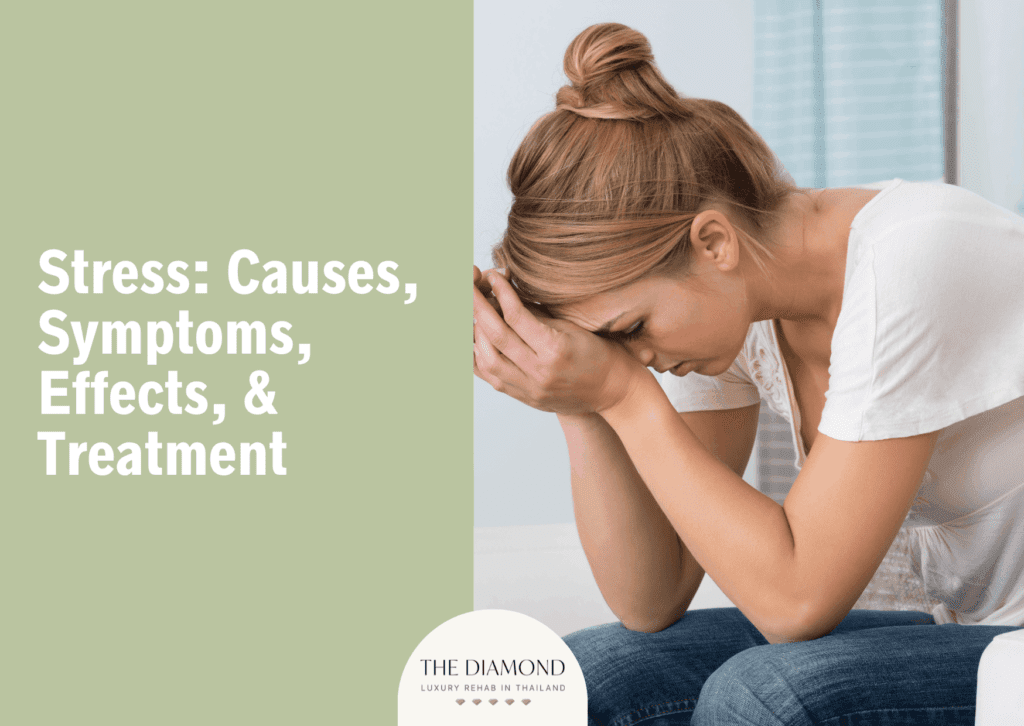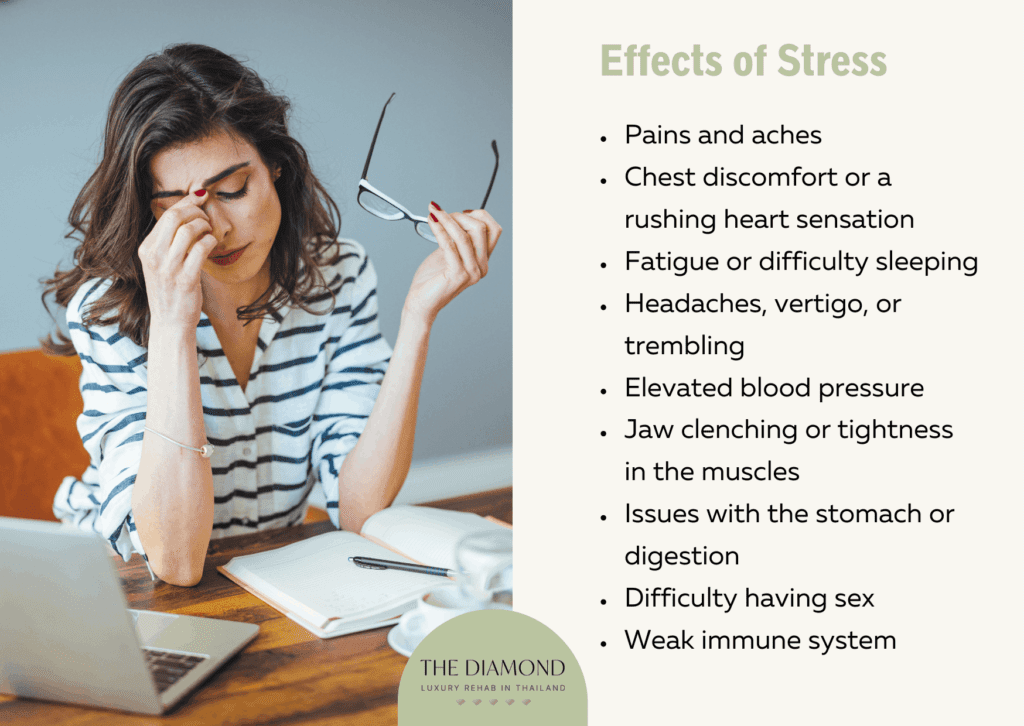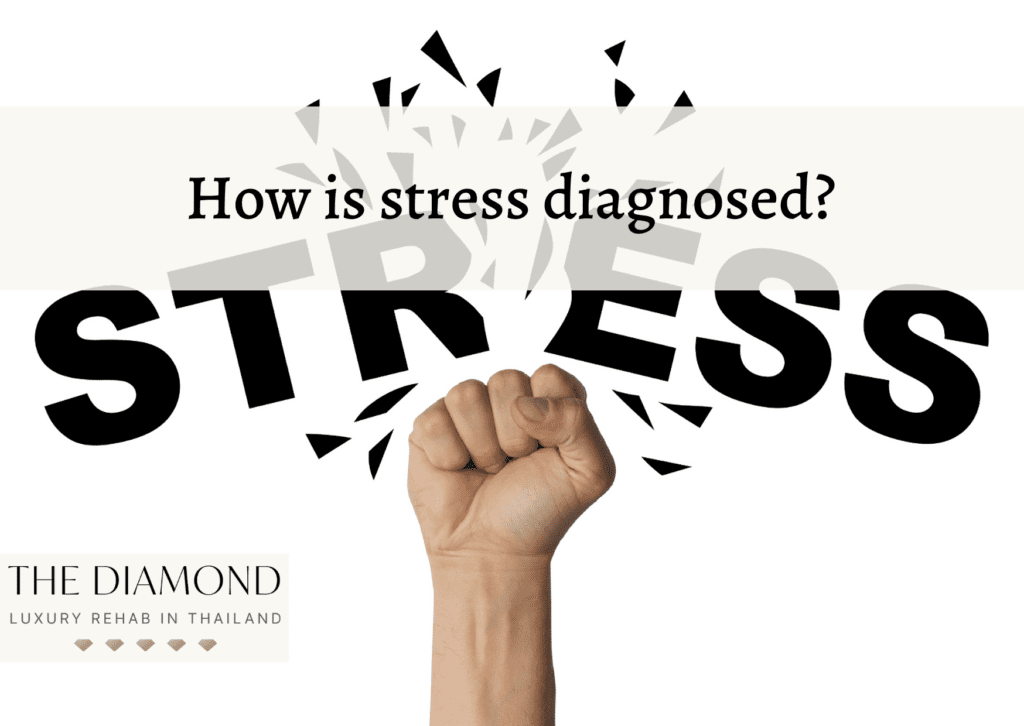Stress: causes, symptoms, effects, and treatment

Stress is the body’s natural response to any kind of situational pressure and tension. Stress can have multiple causes, including loss of a job, relationship difficulties, major life changes, death of a loved one, financial problems, divorce, unhealthy lifestyle, and work pressure, to name a few.
Symptoms and signs that are indicative of stress can manifest in physical, emotional, and mental ways. Symptoms of stress include headaches, inability to concentrate, trouble sleeping, increased irritability, panic attacks, upset stomach, and exacerbation of pre-existing medical conditions.
Needless to say, stress affects our body and brain in different ways. Some effects of stress include aches and pains, chest pain, changes in sleeping patterns, anxiety, and a weakened immune system.
Treatments for stress include medication, psychotherapy, and other mindfulness-based stress reduction techniques. While there is no quick-fix cure for stress, these treatment options can help those who struggle with it.
What is stress?
Stress is a common and normal response to a perceived threat, overwhelming life situation, and major challenges. It triggers a biological response where our body’s defenses kick into an automatic process called the “fight-or-flight” reaction, also known as the “stress response.”
While it is a normal feeling that we get in the face of emotional or mental pressure, stress that goes beyond a certain point can do more harm than good. Excessive stress can cause major damage to one’s health, productivity, and even quality of life.
What are the causes of stress?
The most common causes of stress are listed below.
- Loss of a job: Experiencing stress over a job loss is very common, as it affects our identity or sense of self. But aside from that, it can also cause financial difficulties, mood swings, and negative impacts on one’s emotional and mental health.
- Relationship difficulties: While relationship problems can lead to stress, it is also true that stress can create difficulties in relationships and can also cause couples to see problems in their relationship that are not actually there.
- Major life changes: Dealing with major life changes, such as having a new baby, moving into a new house, or suffering from a major injury or illness, can cause a great deal of stress. These big changes can have a significant impact on one’s life and can even cause a temporary condition in adults and children called adjustment disorder.
- Death of a loved one: The pain of losing a loved one can be overwhelming, putting undue stress on individuals, and ultimately leading to a major emotional crisis. While stress is an initial and natural response to the intense grief and pain following the death of a loved one, people can learn healthy ways of coping with loss as they learn to heal over time.
- Financial issues: Financial difficulties can be a source of overwhelming stress. The state of emotional tension that is related to money, debt, or upcoming expenses is called financial stress. Financial difficulties can have a significant impact on mental health, relationships, and overall quality of life.
- Divorce: A divorce is a major life-changing event that triggers a plethora of emotions nd can easily leave someone feeling emotionally drained. After all, you have to start over, make the decision to keep the house or move, and grieve over the end of the marriage all at the same time. A divorce or separation is one of the most stressful life situations a person can find themselves in.
- Unhealthy lifestyle: Aside from life stressors, unhealthy lifestyle choices are also linked to high-stress levels. Unhealthy lifestyles, such as smoking, drinking, lack of exercise, and an unhealthy diet can cause stress and other mental health issues.
- Work pressure: Work-related stress may arise due to a number of reasons, including work demands and pressures without an increase in job satisfaction. Stress at the workplace can contribute to various problems, including changes in sleep patterns, headaches, short temper, and an upset stomach.
There is no single reason for stress. Instead, it is a culmination of various complex factors as described above that can overwhelm a person.
What are the symptoms of stress?
Stress is emotional tension that can manifest in physical, emotional, and mental ways. The symptoms of stress are listed below.
- Headaches: Stress can trigger or worsen tension-type headaches and migraine. Stress headaches are typically mild or moderately painful, and can feel like there is a tight band around your head.
- Difficulty concentrating: Stress can lead to poor concentration. Because it activates your fight or flight response, stress can keep you from concentrating on one single task, as it only makes you aware of threats in your immediate environment.
- Trouble sleeping: Stressful life events or trauma can drive you into overthinking and therefore keep your mind active at night. This can cause sleep problems, or worsen already existing ones. The tension in your body can adversely affect your sleep quality and duration, and lack of proper sleep can also increase stress levels even more.
- Increased irritability: Life stress can contribute to increased irritability, which makes an individual more easily upset, angered, or offended. Irritability is associated with angry outbursts and is considered an irrational response to stress.
- Panic attacks: When tension and pressure become exaggerated, it can cause anxiety, whose main symptom is a panic attack. Panic attacks occur suddenly and unexpectedly during periods of stress.
- Upset stomach: Stress can also take a physical toll on your digestive system by either slowing down digestion, causing stomach pain, constipation, or bloating, or speeding digestion up, in which case it causes diarrhea and frequent trips to the bathroom.
- Worsening of pre-existing medical conditions: There is a wide array of illnesses related to stress, including heart disease, tension headaches, obesity, Alzheimer’s disease, asthma, diabetes, gastrointestinal problems, depression, and other mental health conditions. Oftentimes, many people do not realize that stress is to blame for these illnesses and the symptoms they are experiencing.
What are the effects of stress on the body?
The definition of stress, as stated by the National Library of Medicine, is that it is characterized by physical or emotional tension from any situation or event that can make you feel pressured, angry, or frustrated. Needless to say, constant stress can have adverse effects on an individual. The effects of stress on the body are listed below.

1. Pains and aches
Increased levels of stress can cause tightness in your muscles and spasms of pain. It can lead to stress-induced aches and pains, especially around the back, neck, and shoulders. A study published in the Physical Therapy & Rehabilitation Journal also states that chronic pain may be linked to higher levels of stress and increased levels of cortisol, which is the hormone involved in stress.
2. Chest discomfort or a rushing heart sensation
Muscle tension due to stress can manifest itself as tightness in the chest, causing discomfort and pain in the area. Apart from that, stress can also trigger the production of hormones, such as adrenaline and cortisol, which can increase heart rate and blood pressure.
3. Fatigue or difficulty sleeping
Excessive stress can cause chronic fatigue and sleep problems. Accumulated stress from personal or work lives is particularly associated with a general feeling of tiredness that does not go away and sleep disruptions that may eventually lead to insomnia.
4. Headaches, vertigo, or trembling
Headaches and vertigo are some unpleasant side effects of chronic stress. Not only can emotional or mental stress trigger vertigo, it can also worsen your symptoms and even contribute to inner ear dysfunction. Furthermore, when the body goes into fight, flight, or freeze mode, it can experience physical reactions, such as tremors or shaking.
5. Elevated blood pressure
Although there is no evidence that stress can cause long-term high blood pressure, it is a fact that stress triggers a surge of hormones in the body. This increased production of hormones can cause your heart to beat faster and therefore lead to elevated blood pressure. That said, prolonged stress can still take a significant toll on your health.
6. Jaw clenching or tightness in the muscles
Experiencing high levels of emotional, mental, or physical stress can cause someone to unconsciously clench their jaw while waking or sleeping. This condition is medically known as bruxism and may happen during stressful situations without the person even noticing it.
7. Issues with the stomach or digestion
Stress can cause a wide array of gastrointestinal issues, including bloating, cramping, indigestion, inflammation, and a lack of appetite. This is because the stress response slows down or temporarily disrupts the flow of digestion, which causes abdominal pain and other gastrointestinal symptoms.
8. Difficulty having sex
High levels of stress hormones like cortisol can lead to decreased sex drive. When stress is chronic, cortisol production becomes out of control, leading the body to think that it does not need sex hormones at the moment. This results in the continuous decline of testosterone levels and eventually decreased interest in sex.
9. Weak immune system
Greater levels of the stress hormone cortisol can also suppress your immune system’s ability to fight off foreign substances called antigens. Cortisol weakens the immune system by lowering the number of lymphocytes present in your blood. Another dangerous indirect effect of chronic stress on the immune system is that it may encourage a person to develop unhealthy coping strategies to relieve stress, such as smoking or drinking. Over time, high levels of stress can also increase your risk of developing an autoimmune disease, as reported by Autoimmunity Reviews Journal.
What negative mental effects can stress have?
Continued stress can result in a wide array of psychological problems. The most common negative mental effects of stress are listed below.
1. Anxiety
Prolonged stress and chronic exposure to cortisol as well as other stress hormones can trigger clinical anxiety, which is a medical condition characterized by excessive and persistent worries that interfere with a person’s daily functioning. The symptoms of anxiety include restlessness, feelings of danger, panic, or fear, trouble concentrating, tense muscles, sleep problems, and rapid heartbeat. Several factors contribute to the development of an anxiety disorder, including genetics, stress buildup, co-occurring mental health disorders, and underlying medical conditions. Anxiety is a serious issue with negative consequences that can manifest in different ways. The effects of anxiety include gastrointestinal issues, heart disease, breathing difficulties, memory problems, and a greater risk for other illnesses due to a weakened immune system.
2. Depression
Chronic stress can contribute to depression, and vice versa. This relationship between stress and depression is called bidirectional, which means that the first condition can cause the other, and the other also leads to the first one, and both issues can actually worsen each other. Major life changes can keep someone trapped into an emotional roller coaster, where great levels of stress may result in depression. The symptoms of depression include persistent low mood or sadness, lack of interest in usual activities, feelings of hopelessness, increased irritability, angry outbursts, and frequent or recurrent suicidal thoughts. Though many factors can increase the risk for depression, the main causes of the condition are genetics, a history of physical or sexual abuse, old age, certain medications, and the death or loss of a loved one. Depression or major depressive disorder is technically a major disorder, but its impacts can manifest in physical and psychological ways. The effects of depression include constant fatigue, lack of appetite, cardiovascular problems, weakened immune system, and memory loss.

How is stress diagnosed?
No one test can diagnose stress. Instead, your healthcare professional may conduct a variety of tests, which may include blood and urine tests as well as other assessments aimed at finding out your personal and family health history in order to rule out other medical conditions that may be causing your symptoms.
When other health conditions have been ruled out, your healthcare professional may then evaluate your mental state through the use of questionnaires and a thorough, face-to-face interview to diagnose physical or psychological stress and its effects or determine if you may have major depressive or anxiety disorder.
How can stress be avoided?
Stress can have debilitating effects on your body. Therefore, it is important to learn how to build resilience and cope with stress. Some helpful tips on how to avoid stress are listed below.
- Take good care of yourself: Considering what can stress do to your body, taking care of yourself is an effective way of reducing your stress levels. Some simple yet effective stress reduction techniques that involve self-care are staying hydrated, having enough sleep and rest, exercising regularly, and avoiding alcohol and drugs.
- Start a regular relaxation practice: Relaxation techniques for stress relief can help your body relax and boost your mood, as stated by the Mayo clinic. Some powerful relaxation techniques to reduce stress include mindfulness meditation, yoga, deep breathing, massage, and music and art therapy, to name a few.
- Take that much-needed break: Taking a break in general is good for your mental health. Taking breaks help prevent and reduce stress by giving your brain and body the time to recover from stress and a chance to reset, as well as cope with daily life stressors.
- Strengthen your support network: A study published in the journal Psychiatry MMC suggests that people with the positive social support of high quality seem to be more resilient in the midst of stressful life situations. Seeking out social support helps provide feelings of self-worth and usefulness, which may minimize the effects of stress.
- Connect with others: Positive human connections can help build strong interpersonal relationships that can be beneficial for stressed individuals to feel supported. Having someone to talk to is generally good for our mental health and therefore can help manage our stress levels.
- Keep a routine: Stress reduction is just one of the many benefits of maintaining a normal routine. Carrying out routine activities keeps stress from being overwhelming because it creates a sense of normalcy and makes one’s situation appear more controllable.
- Give back to others: Giving back to others actually does a lot for your mental health. Aside from lowering stress levels, a selfless act for others is also connected to less incidence of depression, increased self-esteem, lower blood pressure, and even longer life.
How long does stress last?
Stress can last anywhere between a few days to weeks or even months. Stress psychological definition suggests that feelings of tension usually go away soon after the stressful situation is over. This is why acute stress normally resolves within two to three days. However, stress that lasts for weeks or months may be a cause for concern and may indicate chronic stress according to the American Psychological Association.
Chronic stress is a constant sense of feeling overwhelmed and experiencing heightened alertness over an extended period of time. Long-term stress can be debilitating and may contribute to problems for the heart and blood vessels.
When should I get treatment for stress?
You should get treatment for stress when it becomes overwhelming, and you start developing unhealthy coping strategies to cope with it. Too much stress can become overwhelming to the point that a person feels they cannot manage their own emotions alone anymore.
If you start feeling this way, you should seek medical attention for the stress you are going through. A mental health professional can help by suggesting integrative treatments that help create positive health effects.
What are the treatments available for stress?

The treatments available for stress are listed below.
1. Meditation and mindfulness-based stress reduction
Meditation and mindfulness-based stress reduction (MBSR) are therapies that help manage stress. The stress management tool, meditation, involves settling the mind and focusing on the present moment, helping you achieve a sense of calm and balance, which is good for your emotional well-being. MBSR, on the other hand, is an evidence-based mindfulness program that combines meditation and yoga to assist stressed people with soothing their anxiety and reducing their stress levels, among other proven uses.
2. Cognitive behavioral therapy
Cognitive behavioral therapy (CBT) is a form of psychotherapy aimed at identifying and changing unhelpful thoughts that contribute to a range of mental health problems. In particular, CBT can be used for stress reduction as it can offer you a new perspective on exactly what is stress, and how you can healthily cope with stressful life situations by replacing negative thoughts with positive ones.
3. Acupuncture
Acupuncture is an ancient Chinese healing practice in which thin steel needles are inserted into the body to treat a plethora of physical and emotional health problems. A study published in the journal PLoS One suggests that acupuncture may help reduce symptoms associated with acute and chronic stress by stimulating nerves that relax the body after periods of stress.
4. Massage
Massage therapy is performed by a licensed massage therapist and involves the manipulation of muscles and other soft tissues in the body to improve certain health conditions and enhance wellness. It is a proven method to reduce acute and chronic stress symptoms, and it does so by releasing muscle tension, improving circulation and alertness, lowering the heart rate, and improving immune function.
Everyone experiences stress differently, and it is important to manage it before it starts contributing to a wide array of health problems.

